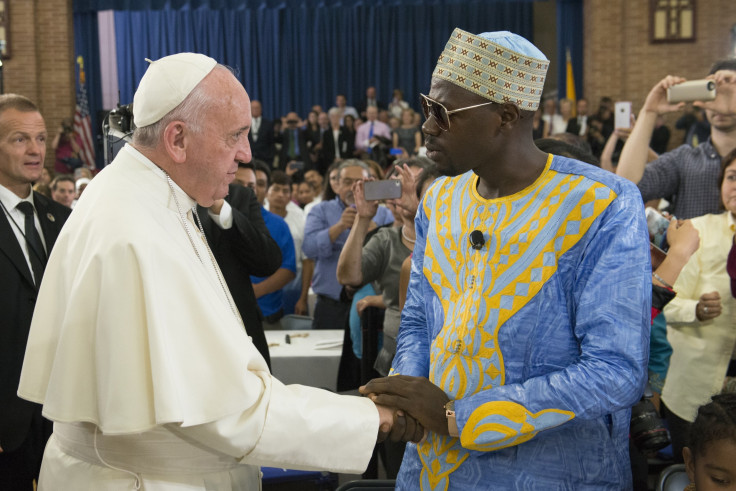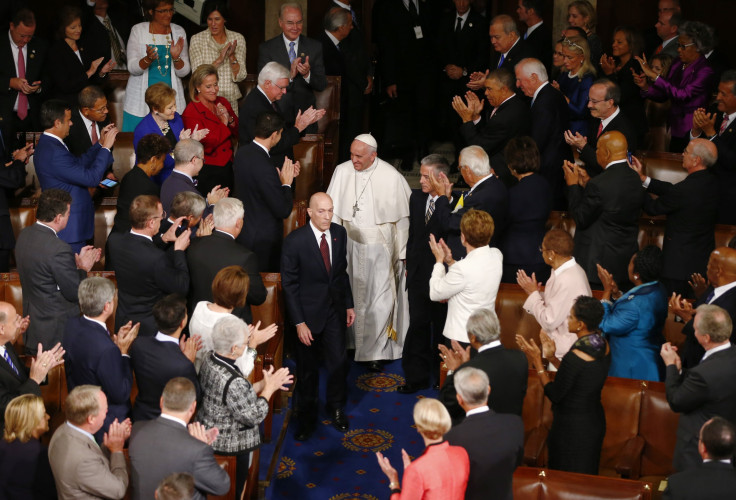Pope Francis And Black Lives Matter: For African-Americans, Pope US Visit Puts Focus On Social Justice And Racial Disparity

NEW YORK -- Harlem's barbershops, beauty salons, sneaker stores and even the liquor market advertising premium spirits are all familiar to Valerie Massard, an African-American woman who has lived for 47 years in the historic black neighborhood. But Roman Catholicism isn’t.
“This is history for me and my daughter,” she said Friday as she joined hundreds of black and brown faces along an upper Manhattan street reserved for Pope Francis’ motorcade Friday. Massard, a Baptist, had gathered with others to see the pope visit a Catholic elementary school during his whirlwind tour of New York City. “To me, he’s a Christian and he was chosen by God to be a messenger for Christ,” she said, adding that the pontiff was appealing to many black Americans because "he's opening up and showing that things need to change to help all of the people, not just some of them."
Pope Francis' visit to Our Lady Queen of Angels School in Harlem, just a few blocks east of Malcolm X Boulevard, named after the Black Muslim icon and human rights activist who was assassinated in 1965, during the African-American civil rights movement, represented another step in the growing relationship between the Catholic Church and the African-American community in the U.S.
While blacks make up a sliver of the nation's Catholic population, some of the faith’s African-American leaders and adherents said the pope’s message on injustice and inequality was an implicit admonishment that blacks had not yet achieved true social and economic parity with their white counterparts. The pope’s repeated mentions of civil rights icon Martin Luther King Jr. this week during his first trip to the United States was an affirmation of what social justice activists have said for most of the year leading up to his visit -- that black lives matter and deserve equal access to the American dream, said some black Catholics.
“I think the pope has already communicated that the voices of the locked out and the left out should be listened to,” said Marc Morial, a lifelong Catholic who is president and CEO of the National Urban League, a black civil rights organization based in New York City. “That’s what the Black Lives Matter movement has been about,” he said, referring to the national social justice movement that first emerged in 2013 as a Twitter hashtag campaign protesting police brutality.
Morial, who was among civil rights leaders invited to the state arrival ceremony for Francis at the White House on Wednesday, said it was most important that the Catholic Church’s U.S. bishops and priests take to heart Francis’ message of social justice advocacy as a charge for all Catholics.
“I don’t expect that [the pope] will go through a checklist of every nuance and political issue,” Morial said by phone Thursday from Washington, D.C. “But are [church leaders] listening and hearing the pope on social justice, and what does that mean going forward?”
A Message Of Civil Rights
The pope is in the middle of a six-day, historic visit to the northeastern United States, where his plans included stops in Washington, New York City and Philadelphia -- major cities with sizable black and Latino populations. Income inequality, the environment, religious freedom and acceptance of immigrants have been themes in his remarks to national and global leaders in Washington, D.C., the United Nations and New York City. Finding solutions to racial disparity is a responsibility of clergy and lawmakers alike, the pope said.
“If politics must truly be at the service of the human person, it follows that it cannot be a slave to the economy and finance,” Francis said Thursday to members of the U.S. Congress. Politics should be “an expression of our compelling need to live as one, in order to build as one the greatest common good,” the pope continued. He added: “I do not underestimate the difficulty that this involves, but I encourage you in this effort.”

During two separate speeches in Washington, the pope evoked the legacy of King, the Protestant civil rights leader whose campaign for full civil and political rights for African-Americans helped the country dream of a better future. “That dream continues to inspire us all,” Francis told Congress.
But one day earlier, he acknowledged that the nation had not reached the symbolic mountaintop that King once preached about. “To use a telling phrase of the Rev. Martin Luther King, we can say that we have defaulted on a promissory note, and now is the time to honor it,” the pope said Wednesday at the White House.
Black leaders across the nation said they found the pontiff's theme of civil rights inspiring. Bishop Shelton Fabre of the Houma-Thibodaux diocese, just outside New Orleans, attended Francis’ address to a joint session of Congress on Capitol Hill on Thursday. The pope’s message on social justice could not have been any clearer, he said Friday by phone from Schriever, Louisiana.
“The pope would remind us that when we put our hearts and minds together as sisters and brothers in the Lord, we have done well by minority communities,” said Fabre, who is also chairman of the subcommittee on African-American affairs for the U.S. Conference of Catholic Bishops. “Together, we can do wonderful things for God,” he added, quoting the words of the Catholic missionary, Mother Teresa.
Staggering Black-White Disparities
There were more than 69 million Catholics in the U.S. in 2013, according to the National Catholic Education Association. But only 3 percent of U.S. Catholics are black, according to a recent Pew Research Center analysis of religious affiliation data.
Although Catholicism is among the most racially diverse faith groups in America, it has that distinction thanks to a sizable Hispanic minority. The two largest historically black Protestant Christian denominations, the National Baptist Convention and the African Methodist Episcopal Church, have almost exclusively black members, the Pew Research Center’s analysis found.
Those faith traditions lent the voices of King, who was a Baptist minister, and activist Rosa Parks, who was a member of the AME church, to the African-American civil rights movement of the 1950s and 1960s. But black Catholics were not absent from the movement, said the Rev. Maurice Nutt, director of the Institute for Black Catholic Studies at Xavier University of Louisiana in New Orleans.
Black Catholics participated in the King-led march for voting rights from Selma to Montgomery in Alabama in 1965 and the anti-poverty March on Washington in 1963, Nutt said Thursday by phone from New York City. “We serve a God who is a God of justice and who hears the cries of the poor,” he said.
The African-American unemployment rate was 9.5 percent in August, more than double the 4.4 rate for whites. For black Americans, who make up about 13 percent of the country’s 318 million residents, income and wealth have been stagnant as the U.S. economy recovered from the recession of 2007-09, the worst economic downturn since the Great Depression. White families on average had seven times the wealth of African-American families, according to a recent study by the Urban Institute, an economic policy think tank based in Washington, D.C. In addition to an income and wealth gap, social justice activists have decried healthcare and criminal justice disparities between black and white Americans.
The recent civil unrest and protests over police-involved deaths in the majority-black cities of Ferguson, Missouri, and Baltimore have prompted a Black Lives Matter symposium at Xavier University, scheduled for early November. The Catholic Church missed many opportunities to evangelize the African-American community and has not always gone out of its way to learn black history and culture, Nutt said.
“If we value life and see it as holy and sacred, then we must seek to save all lives and protect the most vulnerable and innocent in our communities,” said Nutt, a Redemptorist priest for more than 25 years. “This would include black-on-black murders in our urban communities, as well as the unwarranted murders of unarmed black people [by police].”
'He's Showing Others How To Be Christ-like'
A crowd in Harlem let out a collective groan Friday when two large city sanitation trucks pulled in front of them, blocking their view of the street the pontiff was on. Some were not able to see Francis on his first pass at the Our Lady Queen of Angels School, but 26-year-old Michelle Darden did.
“I never got to see [Popes] John Paul or Benedict,” said the lifelong black Catholic who traveled from New Jersey and waited two hours along police barricades. “I can relate to him [Francis] because he’s putting himself out there” as a man of the people who seems aware of the issues important to black Americans, she added.
Darden and her friend, Danielle Burger, a 27-year-old black Catholic and fellow New Jerseyan, said they'd follow the pope to his next and final stop in Philadelphia, where he was expected to visit a prison and hold Mass on Saturday for thousands at the World Meeting of Families. “I love his message about volunteering,” Burger said, referring to Francis’ visit with poor and homeless residents of Washington, D.C. “He’s showing others how to be Christ-like.”
Darden and Burger left the area before Francis’ motorcade rounded the corner away from the school. This time, nearly everyone got a glimpse of the pope smiling and waving from his Fiat. In the diverse crowd of black, white and Latino New Yorkers, there were very few dry eyes.
© Copyright IBTimes 2024. All rights reserved.





















